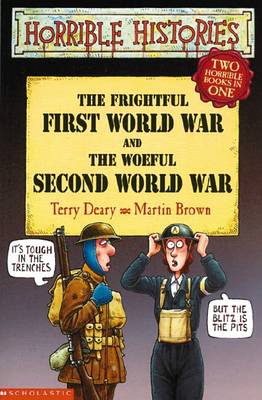
History with twice the nasty bits! Want to know: How sniffing your own pee could save your life in the First World War? Why wearing white knickers could get you killed in the Second World War? How a pair of old socks gave away top secrets? The Frightful First World War tells you all the horrors and hardships of the war that was meant to last four months ...but ground on for four grim years. The Woeful Second World War gives you the dire details about the worst war ever - from snow-bound cities under siege to fly-infested jungle trenches. Read on for curious quizzes, rotten recipes, gruesome games and terrible tests ...for your teacher! History has never been so horrible!
This was a special two-book omnibus and both were much better written than the Ireland book; in fairness, both covered much smaller time spans, which I'm sure made it easier on the writers.
There wasn't a lot new here for me, but it was all condensed down, making the reality of the world wars feel far more confronting and stark. 300+ page history books have the luxury of diluting the horrors with the more mundane realities of war: statistics, dates, facts, etc. The nature of "Horrible Histories" cuts all that out and all you end up with is the "horrible" and there aren't enough humorous cartoons and alliterations in existence to dull or dilute the words.
It amazes me that these are written for teens (got I hope it's teens and not younger kids!). It amazes me in a confronting way: the authors don't hold back at all; the stuff of nightmares are in these pages, from the facts to the first hand accounts. It also amazes me in an "I wish we'd had these in school" way; this is what I'd want my kids to learn about the world wars. Maybe if kids were subject to the reality of wars before they were subjected to the romance, there'd be less romanticising of war from the start.
I found the quote at the end to be particularly resonant:
"Why is it that the ones who most need to remember are the ones most likely to forget?"
Reading updates
-
Started reading
-
26 January, 2018:
Finished reading
-
26 January, 2018:
Reviewed
